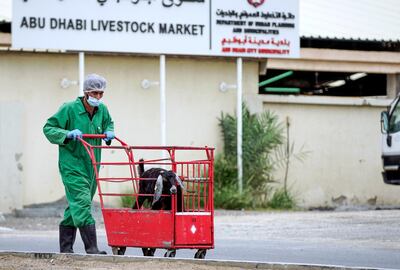The waiting rooms of Abu Dhabi's slaughterhouses are typically hives of activity at the start of Ramadan, filled with bustling crowds of customers bellowing instructions for their favoured cuts of meat.
But this year, as the UAE and the rest of the globe is gripped by the coronavirus pandemic, it is a more sombre atmosphere.
The many customs and traditions of Ramadan are still celebrated but authorities have had to find ways to adapt, with health concerns paramount.
That is not to say it will not be a busy period, with the emirate's government-run slaughterhouses preparing to receive 70,000 animals for iftar meals.
Customers are asked to wait in their cars to avoid contact with others.
A cashier walks over to vehicles to take orders and cutting details, while another receives the animal from the car and takes it to the butchers.
A municipal supervisor and a vet are on site overseeing every order.
“The whole process happens while the customer waits in his car and they can enjoy free internet provided by the municipality,” said Khalfan Al Muhairbi, section head of Abu Dhabi Slaughterhouses.
“Those are new procedures to avoid the spread of coronavirus.
“Now you can only see empty seats in the back. Usually there are lines of chairs in the middle for customers to sit.”
While the municipality has provided two mobile apps for people to order their meat and have it delivered, many customers prefer to pick the animal and explain the details of their order in person.

“First, when we stated this procedure of customers staying in their cars, we thought many would complain,” Mr Al Muhairbi said.
“But we see people reacting differently. They like it when they stay outside, your meat is cut the same way and the doctor will check it the same way.”
Mohammed Al Barrawi, 41, who waited with his wife to receive their meat, said he struggled to come to terms with the change.
“It is different when you go inside to see your own animal getting slaughtered and you recite prayers and instruct the butcher how to slaughter and cut the meat,” said the Palestinian, who works as a general manager.

“Now I have no idea what is happening with my zabeeha [slaughtered animal].
"They will give it to us already cut and covered in bags. I will only find out when I go home.”
Mr Al Barrawi said he gave his instructions but wasn’t confident he would receive exactly what he asked for.
He suggested placing screens in the car park to allow customers to watch the process.
The new procedures have placed a bigger burden on slaughterhouses.
More workers are needed to transfer information and orders between customers and butchers.
Supervisors and vets are also required to wait outside in the heat as each order is received.
The slaughterhouses are cleaned regularly and the temperature of each employee is checked every morning.

Those who seem unwell are taken straight to hospital.
Despite the changing times, Abu Dhabi Municipality expects this Ramadan to be busy.
Mr Muhairbi said that by noon on Sunday, slaughterhouses had received 13,000 animals.
“I think this year there will be more demand," he said.
“No one will go outside for iftar meals, tents are closed, there are no social gatherings.
"People will stay at home to dine so they will buy more meat for the house instead of going outside to eat.”
About 145 butchers and 300 workers will operate the emirate’s four public slaughterhouses.
“We have a big number to meet the high demand of people," Mr Al Muhairbi said.
“We are bringing animals from India, Somalia, Oman, Cyprus and Europe. The biggest quantity is from Australia.”
But local livestock remains the “most popular and expensive because of its quality”.

The animals include cattle, sheep and camels. Prices range from Dh200 to Dh3,000.
All tools are washed and disinfected after each step of the procedure, and a vet checks the animal, meat and organs to ensure they are safe to eat.
If the animal is deemed unhealthy, the order is cancelled.
“If the customer bought it from the livestock market we have an agreement with them to compensate the customer with another animal,” Mr Al Muhairbi said.
But if a customer brings an animal from his own farm or source, they must buy another one.
“The health procedures exist from before, because humans and animals share diseases that are stronger than coronavirus," Mr Al Muhairbi said.

